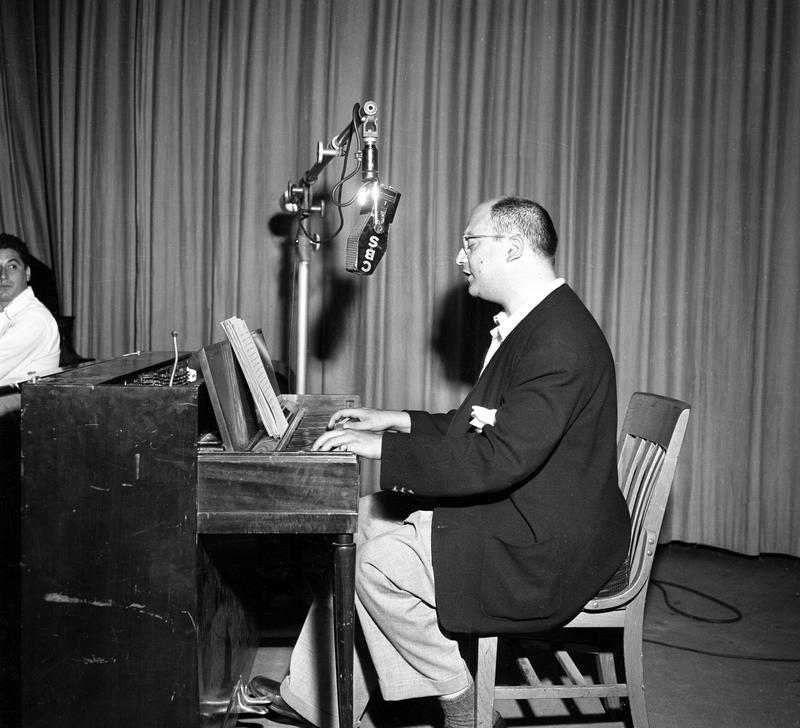Abe Burrows, Librettist and Proud of It

"I'm a librettist and proud of it," Abe Burrows tells a seminar sponsored by the American Society of Composers, Authors, and Publishers. The well-known script doctor, director, and, yes, librettist, says he is still asked by people when is he going to write a "serious" play. This 1962 talk is his answer, an impassioned plea for the Broadway musical to be taken seriously as "a tremendous, fresh, almost new American art form…the American opera."
Burrows was no stranger to facing an audience. Before going behind the scenes he had been a show biz performer in radio and nightclubs. His schtick here is irresistible, the streetwise, borscht belt comic delivery masking thoughts of a serious dramatic craftsman. Emphasizing the importance of what he does, Burrows proclaims, "the libretto is not the most important part of the musical show…but it is." Though ceding true artistry to the many great composers he has worked with—there are stories about Frank Loesser, Cole Porter, Richard Rodgers, and many more—Burrows insists that without a strong libretto a show can't succeed. Part of the reason a show's book is regarded as of secondary importance stems from it being seen as merely the spoken intervals between songs. In fact, the libretto is "a complete collaboration" with the composer, ideally resulting in a "unity of feeling" that defines the entire production.
During question time he rejects the artificial distinction between character songs and plot songs, arguing that the song has no "role" within the production, to advance the action, say, or shine a light on the singer's motives. Indeed, so passionately does he argue for a deep underlying unity to everything in the production that for a moment he lets his kid-from-Noo-Yawk manner slip and rejects the concept of "purpose " in art, saying, "It's a teleological term. I'm here…and maybe a purpose comes out of my being here." The whole talk is a similar mix of penetrating moments, anecdotes, and sage advice. When asked about high comedy and low comedy he warns the audience of would-be show writers there are only two types of comedy, "funny and unfunny. High comedy means no laughs."
Abe Burrows (1910-1985) had already helped create the hit radio show Duffy's Tavern and recorded many classic "gag" songs such as "The Girl With the Three Blue Eyes," when he collaborated with Frank Loesser on the ground-breaking 1950 Broadway musical Guys and Dolls. For the next several decades he was one of the most sought after librettists and directors, as well as being rumored to be the uncredited "doctor" for many an ailing show during out-of-town tryouts. The fresh eye and above-mentioned commitment to the musical expressing a single organic idea is illustrated in this anecdote from his obituary in the New York Times:
"In 1961, How to Succeed, another Loesser-Burrows collaboration, became a phenomenal success on Broadway. Mr. Burrows recalled: 'When we were working on How to Succeed, Frankie kept saying, 'I gotta have a ballad.' So one day he said, 'I've got it.' It was I Believe in You and it was a nice song. But I started to think. And I said, 'Frankie, you're going to kill me, but how would you feel if the fella sings it to himself? 'You know, it's a story of a guy climbing up, a real egotist.' And Frankie looked at me and he says, 'Damn it,' and he got very angry with me because I was taking away his ballad. He wanted it to be a love song.' Mr. Burrows said Mr. Loesser, whose flashes of anger never lasted very long, then 'gradually began to get a look on his face that was almost like a smile' - and, grumbling, accepted the idea that was to set the whole tone of the musical."
But the man we hear in this talk, funny, avuncular, wise, is only half the story. Burrows was involved in left-wing politics, "sang" before the HUAC Committee, and was a member of the Executive Council of the Dramatists Guild. In a 1955 self-described "rambling discourse" he painted a much harsher picture of the theatrical world he inhabited:
"Playwrights are the products of their culture. They reflect every strength and weakness of the culture, both as artists and as human beings. This is a confused age we live in and the dramas depicting it are bound to be just as confused. This is an age that equates value with success. In fact, it values only success and, in turn, success is largely valued in terms of money. In striving for this monetary success, all of us are scrambling in a huge market place. Our playwrights are right smack in the middle of that marketplace, too. And that is a deadly spot for a man who is trying to give insight into his world."
Audio courtesy of the NYC Municipal Archives WNYC Collection.
WNYC archives id: 150275
Municipal archives id: LT9483
